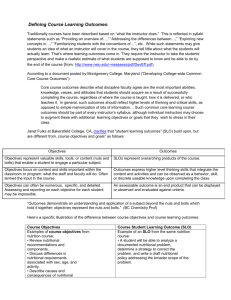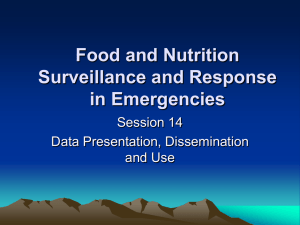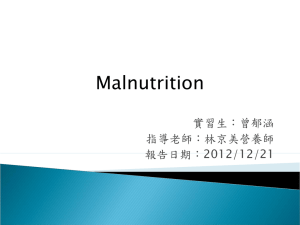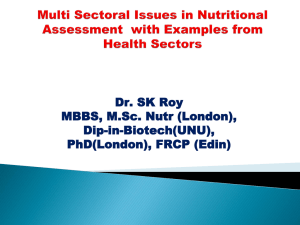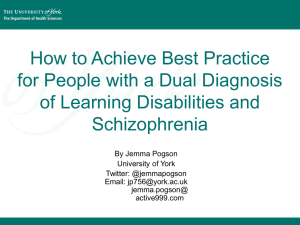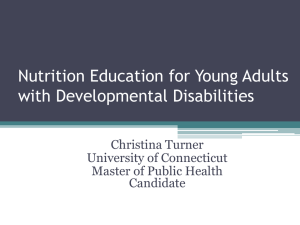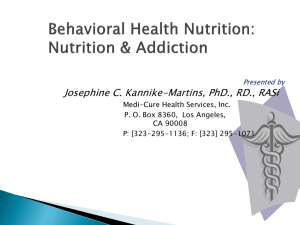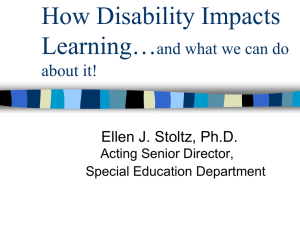Presentation - University of Pittsburgh
advertisement
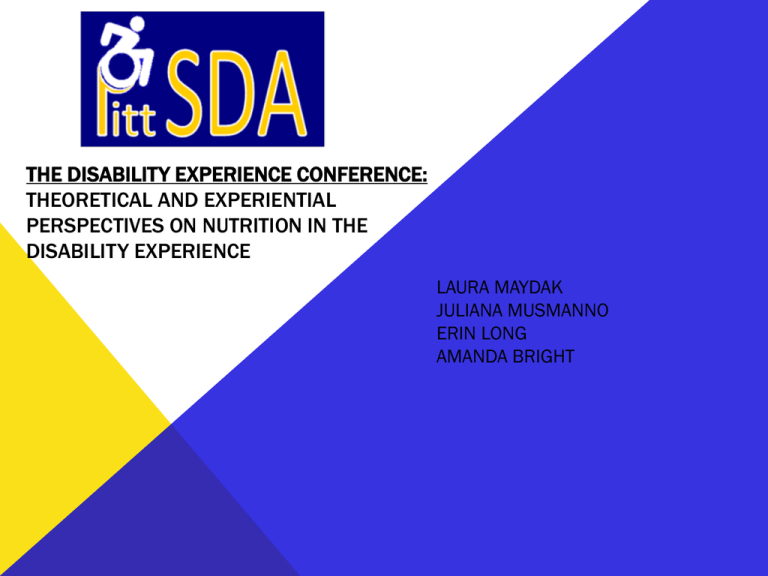
THE DISABILITY EXPERIENCE CONFERENCE: THEORETICAL AND EXPERIENTIAL PERSPECTIVES ON NUTRITION IN THE DISABILITY EXPERIENCE LAURA MAYDAK JULIANA MUSMANNO ERIN LONG AMANDA BRIGHT BACKGROUND • The effect of disability and nutrition on one another is often overlooked • Socioeconomic, mental, physical, and emotional disabilities affect one’s nutritional status and needs • Relevant experiences of students in University of Pittsburgh's Coordinated Master in Nutrition & Dietetics (CMD) will be highlighted • The critical role of a Registered Dietitian (RD) in aiding persons with disabilities will be addressed INVESTIGATING NUTRITION & THE DISABILITY EXPERIENCE • Involvement in community-based nutrition events has revealed many populations in need of nutrition-related guidance • Socioeconomic, mental, physical, and emotional disabilities must all be addressed when considering nutrition and the disability experience • A preliminary analysis of select studies was conducted to evaluate the nutritional aspect of the disability experience1-2 • The examination revealed the need for dietetic intervention in the care of individuals with a variety of disabilities THE MOVE FROM A LONG-STAY LEARNING DISABILITIES HOSPITAL TO COMMUNITY HOMES: A COMPARISON OF CLIENT’S NUTRITIONAL STATUS • Methods: • Nutritional risk screenings were given pre-departure and one year post-departure from a long-stay learning hospital • Results: • Comparison between screenings revealed an increase in overall risk relating to food groups, unintentional weight gain and loss, and overall risk relating to weight • Conclusion: • This population is at risk for nutrition-related problems when living independently • Nutritional intervention provided by an RD would produce more favorable outcomes relating to health status and overall quality of life 1 PREVALENCE AND SEVERITY OF FEEDING AND NUTRITIONAL PROBLEMS IN CHILDREN WITH NEUROLOGICAL IMPAIRMENT: OXFORD FEEDING STUDY • Method: • Validated questionnaire was sent to parents children with oromotor dysfunction • Results • Respondents included a wide range of disabilities • Gastrointestinal and feeding problems were common • The feeding process was described as stressful and unenjoyably • Conclusion: • Concern regarding nutritional status was revealed • 64% of children had never had a feeding- or nutrition-related assessment 2 MAINSTAY LIFE SERVICES • Independent study (University of Pittsburgh Coordinated Masters in Nutrition & Dietetics) • Pilot project for development and implementation of healthy cooking classes for caretakers and disabled individuals at Mainstay Life Services, an assisted living facility • • Nonprofit organization that provides residential services to individuals with developmental disabilities 24-hour full care homes Semi-independent living Supported living (less than 30 hours/week of assistance) 165 individuals in 59 homes throughout Allegheny County MAINSTAY LIFE SERVICES • Taught healthy cooking classes to disabled individuals and staff members Understand and accommodate specific needs of this population Tailor teaching methods for this group Comfort in familiarity and fear what is unknown Not open to trying new things no matter what the health benefit Easy recipes that they can make for themselves on their own Nothing too complicated or with a lot of ingredients MAINSTAY LIFE SERVICES • How can a Registered Dietitian (RD) help? Include nutritious ingredients in common recipes Recipe substitutions (Greek yogurt example) Effectively work with this population to incorporate nutrition and understand the basic essentials to a healthy lifestyle INDEPENDENT LIVING AND CHRONIC CONDITIONS: ARTHRITIS • Chronic health conditions can impair the functionality of free-living individuals • Disabling chronic conditions are areas of opportunity for quality of life improvement • Serving the unique nutritional needs of a population can have a positive impact on quality of life • Rheumatoid Arthritis • Osteoarthritis • Applicable research questions posed by members of the arthritic community as well as professionals working in health care INDEPENDENT LIVING AND CHRONIC CONDITIONS: RESEARCH RESULTS • Review of the available nutrition-based literature • Results from the evidence-based literature review showed potential for dietary interventions in treating symptoms of arthritis3,4,6-9 • Necessity for further research will help to strengthen the findings and allow for subsequent clinical trials to be conducted • Role of the RD in research • Conducting research trials as practicing health care professionals • Holding knowledge of both chronic health conditions and nutrient metabolism • Increasing accessibility to diverse populations through outpatient and community education CONCLUSION • Each disability has a unique influence upon the affected individual • Registered Dietitians are the credentialed experts able to: • Understand the underlying science and its application in determining the nutritional needs of an individual • Navigate complex motivations (behavioral, genetic, environmental, etc.) behind what, why, and how an individual chooses to eat • Implement evidence-based practices to optimize health and the overall quality of life • The addition of an RD to the medical team is essential to provide individuals with disabilities the best possible healthcare outcomes REFERENCES 1 Bryan F, Allan T, Russell L. The move from a long-stay learning disabilities hospital to community homes: a comparison of client’s nutritional status. J Hum Nutr Dietet. 2000;13:265-270. 2 Sullivan P, Lambert B, Rose M, Ford-Adams M, Johnson A, Griffiths P. Prevalence and severity of feeding and nutritional problems in children with neurological impairment: Oxford Feeding Study. Dev Med & Child Neuro. 2000;42:674-680. 3 Scoditti E, Calabriso N, Massaro M, et al. Mediterranean diet polyphenols reduce inflammatory angiogenesis through MMP-9 and COX-2 inhibition in human vascular endothelial cells: A potentially protective mechanism in atherosclerotic vascular disease and cancer. Archives of Biochemistry and Biophysics. 2012;527:81-89. 4Elkan A, Sjoberg B, Kolsrud B, et al. Gluten-free vegan diet induces decreased LDL and oxidized LDL levels and raised atheroprotective natural antibodies phosphorlycholine in patients with rheumatoid arthritis: a randomized study. Arthritis Research & Therapy. 2008;10:R34 5Your guide to lowering your blood pressure with DASH. U.S. Department of Health and Human Services: National Institute of Health. http://www.nhlbi.nih.gov/health/public/heart/hbp/dash/new_dash.pdf 6Nakasone Y, Watabe K, Watanabe K, et al. Effect of a glucosamine-based combination supplement containing chondroitin sulfate and antioxidant micronutrients in subjects with symptomatic knee osteoarthritis: A pilot study. Experimental and Therapeutic Medicine. 2011;2:893-899. 7Sawitzke AD, Shi H, Finco MF, et al. The effect of glucosamine and/or chondroitin sulfate on the progression of knee osteoarthritis. Arthritis & Rheumatism. 2008;10:3183-3191. 8Caughley GE, James MJ, Proudman SM, et al. Fish oil supplementation increases the cyclooxygenase inhibitory activity of paracetamol in rheumatoid arthritis patients. Complementary Theories in Medicine. 2010;18:171-174. 9Bahadori B, Uitz E, Thonhofer R, et al. Omega-3 Fatty Acids Infusions as Adjuvant Therapy in Rheumatoid Arthritis. J Parenter Enteral Nutr. 2010;34:151-155. 10Arthritis Foundation. www.arthritistoday.org
